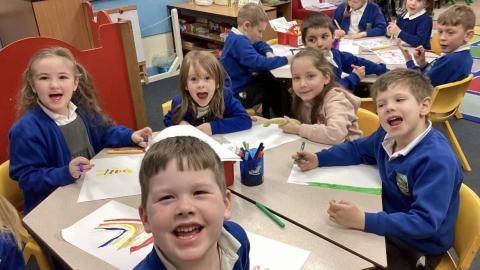PSHE at Settle C.E. Primary School
Vision:
Personal, Social, Health Education (PSHE) is centred around the school’s vision of encouraging children to flourish to achieve their potential. We want to provide opportunities through PSHE for children to learn about themselves and how they can achieve well and become the best that they can be. We promote the development of social skills so the children can be understanding and respectful of others. We teach children about what it means to be a confident citizen and a member of a diverse society and we discuss cultural issues that are a part of growing up. In PSHE the children learn about their own mental health and wellbeing in order to develop strategies that they can then use in the future to support their resilience through life. Relationship and Sex Education (RSE) is an important aspect of PSHE and is taught through a sensitive framework so children can learn and explore key themes throughout their time in school.
Intent:
We aim to provide opportunities for each child to develop their personal and social skills from when they begin with us in Early Years until they leave us in Year 6. Through learning about their mental health and wellbeing we aim for children to develop positive behaviours which will see them achieve well. Research carried out by Public Health England highlighted how promoting health and wellbeing in schools has the potential to improve children’s educational outcomes and their health and wellbeing outcomes.
The aims of PSHE education at our school are to:
-
- Give pupils the knowledge and develop the self-esteem, confidence and self-awareness to make informed choices and decisions;
- Encourage and support the development of social skills and social awareness;
- Enable pupils to make sense of their own personal and social experiences;
- Promote responsible attitudes towards the maintenance of good physical and mental health, supported by a safe and healthy lifestyle;
- Enable effective interpersonal relationships and develop a caring attitude towards others;
- Encourage a caring attitude towards and responsibility for the environment;
- Help our pupils understand and manage their feelings, build resilience and be independent, curious problem solvers;
- Understand how society works and the laws, rights and responsibilities involved.
The aims of RSE at our school are to:
- Provide a framework in which sensitive discussions can take place;
- Prepare pupils for puberty, and give them an understanding of sexual development and the importance of health and hygiene;
- Help pupils develop feelings of self-respect, confidence and empathy;
- Create a positive culture around issues of sexuality and relationships
- Teach pupils the correct vocabulary to describe themselves and their bodies.
Implementation:
At Settle Primary School we follow a whole school approach to PSHE through the resource SCARF, which is provided by Coram Life Education. SCARF stands for Safety, Caring, Achievement, Resilience and Friendship. SCARF provides a systematic spiral curriculum which runs from Nursery to Year 6. Each Year group follows six recurring suggested half termly units with teachers adapting the scheme of work where necessary to meet local circumstances of the school and the children’s needs. The six recurring themes units include:
1. Me and My Relationships
2. Valuing Difference
3. Keeping Myself Safe
4. Rights and Responsibilities
5. Being My Best 6. Growing and Changing
Lessons are taught weekly by the class teacher, within a safe learning environment so that children feel comfortable to learn about a wide range of topics. The SCARF lesson plans list the specific learning objectives for each lesson and provide support for how to teach the lessons. There is planned progression across the SCARF scheme of work, so that children are increasingly and appropriately challenged as they move up through the school. We have selected SCARF as our approach to PSHE and RSE as it ensures in-depth coverage of important topics in an engaging way. Please see our Long Term Curriculum Plan below for a more detailed breakdown of the lessons covered in each year group.
Alongside SCARF, the school use a self-regulation and emotional control approach called Zones of Regulation (ZOR). This is to encourage children to talk about their feelings and emotions in relation to four coloured ‘Zones’. Aspects of ZOR are incorporated into PSHE lessons and used alongside the SCARF curriculum so we have a common language for talking about our feelings and to develop strategies for regulation.
Impact:
Our children are encouraged to engage in activities through PSHE lessons that promote an understanding of themselves as growing and changing individuals, and as members of a wider community. Activities also encourage pupils to understand how their choices and behaviours can affect others, their own health and wellbeing and their environment.
In order to ensure that the children’s understanding of the curriculum is progressing, the PSHE subject leader and the Senior Leadership Team will undertake monitoring and evaluation to ascertain the following:
- That the SCARF scheme of work is being followed and that lessons are being delivered at the appropriate level for the age of the children.
- That children are developing an age-appropriate vocabulary through the themes covered with SCARF.
- That the training needs of teachers are being met, through occasional CPD or more targeted support when required.
This monitoring and evaluation may take the form of informal drop-ins to lessons, conversations with pupils/ teachers and a look at PSHE Class Journals which provide evidence of the activities that are taking place in each year group.
As part of the summative assessment of PSHE teachers highlight and annotate the ‘End of Unit Statements’ after each topic (see documents below) to summarise children’s learning against the key learning outcomes. The PSHE subject leader gives the head teacher an annual ‘Subject Overview Report’ in which teaching and learning of the subject is evaluated (see the document below).


